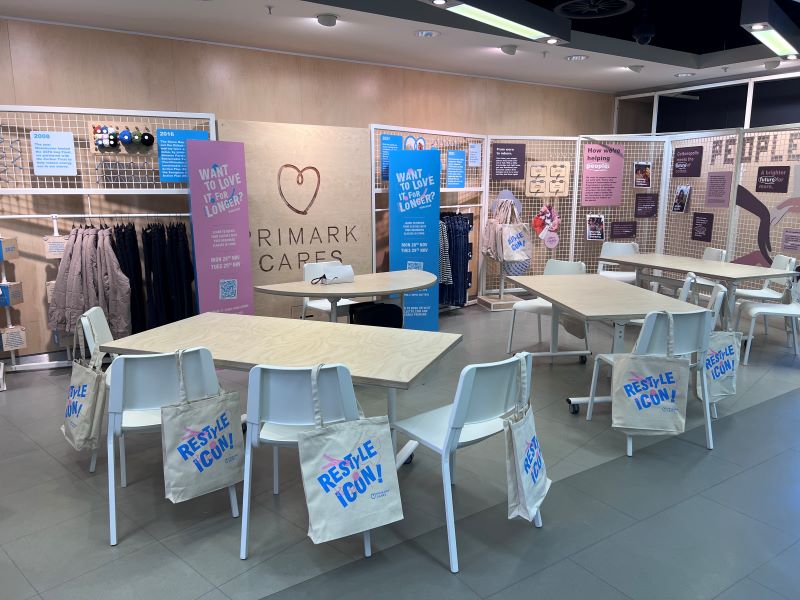Jo Linehan meets Lynne Walker, the Director of Primark Cares, to find out how the Irish-founded international retailer is working to offer more sustainable choices for its customers
Penneys has been a part of the fabric of Irish life for as long as most of us can remember. The iconic retailer has been a go-to for going-out outfits, last- minute holiday essentials and those ‘few bits’ we all find ourselves leaving the store with. What began as a single shop on Mary Street in Dublin city centre in 1969 has grown into a retail behemoth with 428 stores worldwide.
While it may be known as Primark abroad, Penneys remains the name of the shop we all know and love in Ireland. The Primark brand is now global, but with great power comes great responsibility. The fashion industry has been deemed the second most polluting in the world after fossil fuels. More and more customers are demanding accountability and transparency regarding where, how and by whom our clothing is made. Penneys has always held a pioneering vision when it comes to affordable clothing. Now, it’s using that same pioneering spirit to forge a new path to making its fashion more sustainable
Introducing Primark Cares
Primark Cares is a series of commitments aimed at making the business more sustainable and circular over the next seven years. These commitments include making all of its clothes from recycled or more sustainably sourced materials by 2030, halving its carbon emissions, and pursuing a living wage for workers in its supply chain during this period too. While these goals are inspirational, they pose an important question; how can Penneys continue to offer affordable clothing while investing in its Primark Cares strategy?

It’s a question that Lynne Walker, the Director of Primark Cares, is making it her mission to answer. Lynne is responsible for embedding Primark Cares across the business and its supply chain. Having first joined Penneys 12 years ago, working in childrenswear and menswear, Lynne now spearheads a team of 70 people overseeing the change happening across the retailer.
“Primark Cares is more than just a label,” she says. “It’s our commitment to doing better every day. Specifically, we have nine commitments across three key areas – product, planet and people.” Today, 50% of all clothes sold at Primark are made from recycled or more sustainably sourced materials.
Deciphering sustainability
The sustainability conversation is becoming more common, but it can be overwhelming. Terms like ‘value chain’ (the various business activities and processes involved in creating a product or performing a service) and ‘living wage’ (the minimum income necessary for a worker to meet their basic needs) are unfamiliar to many of us.
“We know this space can be complex and confusing, so we make every effort to ensure our customers can make more informed choices,” Lynne says. “From the Primark Cares label, which can be found on clothing, to using QR codes in our stores to direct our customers to our website where they can find out more. We also have a glossary of terms which can act as a jargon-buster around key terms in this space.”
Sustainably-sourced cotton
“We launched our Primark Sustainable Cotton Programme (PSCP) 10 years ago with 1,251 women farmers in Gujarat, India,” says Lynne. “Working in collaboration with agronomic experts CottonConnect and a local grassroots organisation SEWA, our objective was to understand and reduce the environmental impact of our cotton, support the livelihoods of cotton farmers and explore how we could change the way we sourced cotton.
“Since then, through CottonConnect, the programme has expanded to Pakistan and Bangladesh and more recently Turkey. 2023 marks the 10th anniversary of the programme, and we’re on track to have trained 275,00 farmers in more sustainable cotton farming methods by the end of the year.
“After introducing the cotton from our PSCP in our popular nightwear range in 2017, it is now used across all major product categories and departments, including menswear, womenswear, kidswear and homeware. The programme is helping to support our commitment that 100% of the cotton in our clothes will be organic, recycled or sourced from our PSCP by 2027.”

Working close to the loop
Creating a circular economy is also an essential part of moving towards a more sustainable society. Primark defines circularity as designing and creating its clothes with the future in mind so they can be worn again, then given a new life into new clothes or materials once customers are done.
“Primark Cares is now 50% of all clothes sold and customers continue to love the changes we’re making,” explains Lynne. “One of the proudest moments of this year was the launch of our first circular clothing collection. The 35-piece collection included menswear, womenswear and kidswear, and was made up of universally loved shapes, designs and colours that you can mix and match with your wardrobe staples.
“Each piece was carefully designed in line with our new Circular Product Standard. This new framework, based on principles established by the Ellen MacArthur Foundation, brings together years of work to enable our product teams and suppliers to create more circular products that are designed with the end in mind.”
“While we know this is just one small step in our commitment to become a more circular business, we’re excited to now roll these new design principles out across our business and with more suppliers, allowing us to scale it up. Most importantly, customers loved the collection. More to come in this space!”
Future of fashion
For a retailer with the scale of Primark, every positive change has the power to make a significant impact. It’s a responsibility that Lynne says comes with challenges. “Our business has always been based on doing things differently from other brands, so we can keep prices low for our customers,” Lynne explains.
“We don’t do any traditional advertising, use very little air freight, and keep our factory-to-store operations very simple. These measures enable us to offer our customers quality clothing at affordable prices. If our business can make clothes that are affordable but also have a lower environmental impact, we can use our scale to help initiate change right across the industry.”
For Lynne and her team, every challenge has the potential to make a difference. “For us, becoming more sustainable isn’t a choice – it’s vital that we change the way we operate to reduce our impact on the planet and support the livelihoods of people who make our clothes. While we may not have all the answers yet, we’re committed to continuing to learn and evolve, using our scale for good.”

Primark wants to help customers love and wear their clothes for longer. One of the ways they’re doing that is through the ‘Love it for Longer’ repair workshops, a series of free sessions which show or remind people how to repair their clothes and give them a longer life. To date, they’ve hosted over
100 workshops in stores across UK, Ireland, France, Germany, the Netherlands and the US, offering over 1,200 free places to customers and colleagues.
They’ll equip you with all the basics you need to know to make your items last longer, from adding buttons and replacing zips to simple hand sewing techniques. You can sign up to attend an upcoming workshop in a store near you. If you can’t attend in person, you can also visit the website to discover
handy how-to videos with tips and tricks to repair your clothes. Visit: primark.com/en-ie/love-it-for-longer








